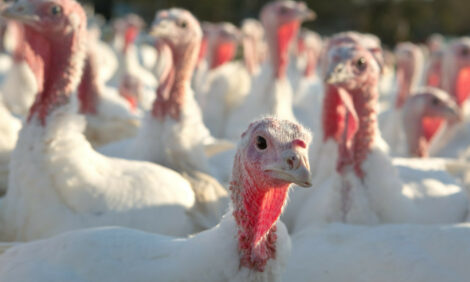



European Approach to IB Control Explored for Use in US Flocks
A novel approach to control of infectious bronchitis (IB) that has been effective abroad may be on the horizon for US producers struggling with the disease in their flocks, according to Dr Mark Jackwood, a molecular virologist at the University of Georgia, US, in the Journal of Poultry Respiratory Protection from Merck Animal Health, US.
The new approach is based on the use of IB
serotypes, and its adaption for the US poultry
industry is being spearheaded by Dr Mark Jackwood,
a molecular virologist at the University of
Georgia, USA.
It is well known that if just one virus in an IB
vaccine is administered, birds will be protected
against that particular virus but not other IB
viruses, Dr Jackwood said.
However, it is also now known that some IB
serotypes have cross-protective ability against
other IB serotypes — a phenomenon that scientists
call ‘Protectotype’. In addition, when two different
IB serotypes are used, birds will develop immunity
not only to those serotypes, but they will develop
cross-reacting antibodies to some of the other IB
serotypes.
“We get a broader type of protection,” he said.
Less Costly
An approach toward IB control involving
Protectotype is largely based on work by Jane
Cook, PhD, a microbiologist in the UK and
recognised authority on IB.
She points out that
IB variants arise frequently and that Protectotype
is less costly and makes more sense than developing
a new vaccine for every variant that arises.
Even though the IB virus is capable of frequent
mutations, she says, the genetic makeup of the virus changes only minimally and the rest remains
the same, which is why some IB serotypes are
able to provide cross–protection.
In Europe and elsewhere, research and field
experience have demonstrated that using an IB
vaccine based on the Massachusetts serotype
followed by one based on the IB variant 4/91 —
a common variant in Europe — can provide
broad protection against many IB variants.
Substitute Strain for US
In his presentation to the World Veterinary Poultry Association (WVPA), Dr Jackwood said: “We
don’t have 4/91 in the US and it’s not permitted
for good reason; the major problem we have
is the Arkansas IB strain. We’re asking what can
we substitute for 4/91?”
To this end, Dr Jackwood spent a week in Europe
with Sjaak De Wit, DVM, PhD, at the Animal Health
Service, Deventer, the Netherlands.
“We vaccinated
specific-pathogen-free birds with Ma5 at one day
of age and with 4/91 at 14 days of age, then
challenged birds with the US Arkansas or Georgia
98 IB strains,” he continued.
Five days after challenge, birds that had received
both the Ma5 and 4/91 vaccines had about 90 per cent
protection against the Arkansas IB challenge, and
there was 86 per cent protection against challenge with
the Georgia 98 strain, which is a Delaware-type
virus, he said (Table 1).
| Table 1. Results in vaccinates and controls after challenge with iB viruses | ||||
| Vaccination | Challenge virus | Number of birds per group | Average protection level against ciliostasis | |
|---|---|---|---|---|
| Day of hatch | Day 14 of age | |||
| Unvaccinated, unchallenged controls | - | - | 5 | 100% |
| Unvaccinated, challenged controls | - | ArkDPI/81 | 10 | 24% |
| Ma5 | - | ArkDPI/81 | 10 | 90% (weak challenge) |
| Ma5 | 4/91 | ArkDPI/81 | 10 | 90% |
| Unvaccinated, challenged controls | - | GA98/0470/98 | 10 | 0% |
| Ma5 | - | GA98/0470/98 | 10 | 37% |
| Ma5 | 4/91 | GA98/0470/98 | 10 | 86% |
In birds vaccinated only with Ma5, protection
against the Arkansas IB challenge was also
determined to be about 90 per cent; this was higher than expected but as it turned out, the challenge was
weaker than intended. As expected, protection
against the Georgia 98 IB challenge was only
about 37 per cent in birds that received only Ma5,
Dr Jackwood continued.
Protection was determined by scoring ciliary
activity in the tracheal epithelium, he noted.
Delaware 072?
|
* "Five days after challenge, birds that had received both the Ma5 and 4/91 vaccines had about 90 per cent protection." |
Dr Mark Jackwood
|
For the US market, Dr Jackwood and colleagues are
going to try substituting IB 4/91 with the Delaware
072 IB strain because it is distinct and may provide
a broader set of antibodies. The studies are underway
and Dr Jackwood hopes to have data to share in
the near future.
He explained that this work involves
determining genetic similarities between viruses, particularly regarding a spike protein on the
outside of viruses, and virus neutralisation testing.
He said: “The spike protein is the one that induces neutralising
antibodies. If we get an amino acid sequence
similarity between spike genes in the high-80 per cent
or low-90 per cent range, there will usually be some
cross-protection.”
The researchers are also carefully examining the
significance of ciliostatis scores and want to find
out if protection against ciliostasis correlates with
protection in the field.
“We know it does in Europe;
we want to see if the same holds true here with
US IB viruses,” he said.
Dr Jackwood is confident that progress can be made.
In an interview, he said: “We already have a lot of
really good vaccines available to us. I think that
we can do a better job of actually applying those
vaccines and getting a little broader protection
using a protocol involving Protectotype.”
Further Reading
|
| - | Find out more information on infectious bronchitis by clicking here. |
May 2012












